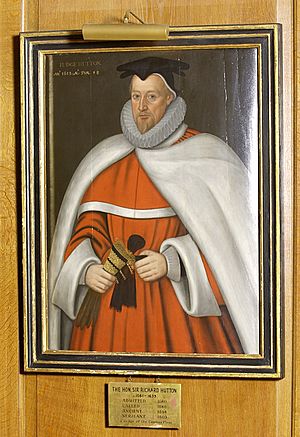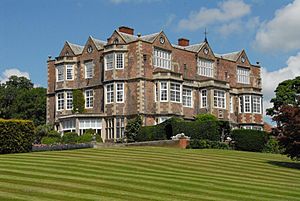Richard Hutton (judge) facts for kids
Sir Richard Hutton (1560 – 1639) was an important person from Yorkshire, England. He was a respected judge who became famous for standing up to King Charles I. He disagreed with the King's demand for a special tax called "ship money."
Contents
A Judge's Journey
Richard Hutton was born in 1560 in Penrith, Cumberland. His family lived at Hutton Hall. He first went to Jesus College, Cambridge to study religion. But at age 20, he decided to move to London to become a lawyer.
He became a lawyer in 1586. In 1603, under Queen Elizabeth I, he was made a "serjeant-at-law." This was a special title for experienced lawyers. Around this time, Hutton bought a large piece of land in Goldsborough, near Knaresborough. He built the beautiful Goldsborough Hall there.
Rising Through the Ranks
Sir Richard Hutton became a very busy man. In 1608, he became the Recorder of York. This meant he was the main legal advisor for the city. He also held similar jobs in Doncaster and Ripon.
In 1617, King James I visited York and made Richard Hutton a knight. This meant he was now called "Sir Richard Hutton." The King also made him a judge in the Court of Common Pleas (England). This was a very important court in England.
Later, under King Charles I, Sir Richard Hutton was well-liked. For about a year, from 1625 to 1626, he was the acting Chief Justice of the Common Pleas. This was the highest judge in that court. He was also a friend and relative of Matthew Hutton (Archbishop of York), who was a very important church leader.
Standing Up to the King
The Ship Money Dispute
In 1635, King Charles I wanted all judges to agree with a special tax called "ship money." This tax was usually only collected from towns on the coast to pay for the navy during wartime. But King Charles I wanted to collect it from everyone, even people far from the sea, and during peacetime. Many people thought this was unfair and that the King needed Parliament's approval for such a tax.
Sir Richard Hutton signed the declaration at first. But in 1638, he made a brave decision. He ruled against the King in a famous case involving a man named John Hampden. Hutton said that the King could not make people pay this tax just by himself, without the approval of Parliament. He said it was only allowed "in time of actual war and invasion."
After this ruling, a church leader accused Hutton of a serious crime called "high treason." But Sir Richard Hutton was found innocent. He even won money in damages because of the false accusation. This showed how strongly he believed in what was right. King Charles I later called him "his honest judge."
Sir Richard Hutton died in 1639. He was buried in London, as he wished. His home, Goldsborough Hall, and his other lands went to his son, also named Sir Richard Hutton.
Family Life
Sir Richard Hutton married Agnes Briggs in 1591. She was from Westmorland. They had four sons and five daughters. His second son, Sir Richard Hutton the younger, took over the family estates after his older brother, Christopher, died young. Sir Richard Hutton also had an older brother named Sir William Hutton.
 | Janet Taylor Pickett |
 | Synthia Saint James |
 | Howardena Pindell |
 | Faith Ringgold |



